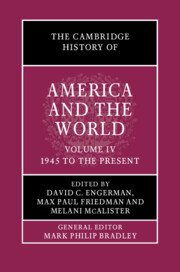Book contents
- The Cambridge History of America and the World
- The Cambridge History of America and the World
- The Cambridge History of America and the World
- Copyright page
- Contents
- Figures
- Maps
- Contributors to Volume IV
- General Introduction: What is America and the World?
- Introduction to Volume IV
- Part I Ordering a World of States
- Part II Challenging a World of States
- Part III New World Disorder?
- 23 The Illusions of the United States’ Great Power Politics after the Cold War
- 24 Neoliberalism as a Form of US Power
- 25 The US Construction of “Islam” as Ally and Enemy on the Global Stage
- 26 Technology and Networks of Communication
- 27 Humanitarian Intervention and US Power
- 28 Refugees, Statelessness, and the Disordering of Citizenship
- 29 Liberty, Security, and America’s War on Terror
- 30 The Global Wars on Terror
- 31 America and the World in the Anthropocene
- Index
28 - Refugees, Statelessness, and the Disordering of Citizenship
from Part III - New World Disorder?
Published online by Cambridge University Press: 12 November 2021
- The Cambridge History of America and the World
- The Cambridge History of America and the World
- The Cambridge History of America and the World
- Copyright page
- Contents
- Figures
- Maps
- Contributors to Volume IV
- General Introduction: What is America and the World?
- Introduction to Volume IV
- Part I Ordering a World of States
- Part II Challenging a World of States
- Part III New World Disorder?
- 23 The Illusions of the United States’ Great Power Politics after the Cold War
- 24 Neoliberalism as a Form of US Power
- 25 The US Construction of “Islam” as Ally and Enemy on the Global Stage
- 26 Technology and Networks of Communication
- 27 Humanitarian Intervention and US Power
- 28 Refugees, Statelessness, and the Disordering of Citizenship
- 29 Liberty, Security, and America’s War on Terror
- 30 The Global Wars on Terror
- 31 America and the World in the Anthropocene
- Index
Summary
American responses to refugee dilemmas in the decades following the Cold War in many ways mirrored the country’s broader and often ambivalent attempts to redefine itself as an enduring global hegemon over that period. During the Cold War, American refugee advocates within and outside of government had promoted refugee assistance as an important tool for advancing US influence internationally, part of the country’s “arsenal of peace” and “strategy of freedom” as one government official put it. Such initiatives purportedly heralded to global and American audiences alike the country’s commitment not only to such soft-power principles of international humanitarianism and an American way of life that welcomed immigrants into a prosperous land of freedom; they were additionally designed to signal America’s prudent, hard-nosed concern with promoting international stability and US national interests, especially in the struggle against communism. As Americans considered what role the United States should play in a post-Cold War world that President George H. W.
- Type
- Chapter
- Information
- The Cambridge History of America and the World , pp. 662 - 683Publisher: Cambridge University PressPrint publication year: 2022



